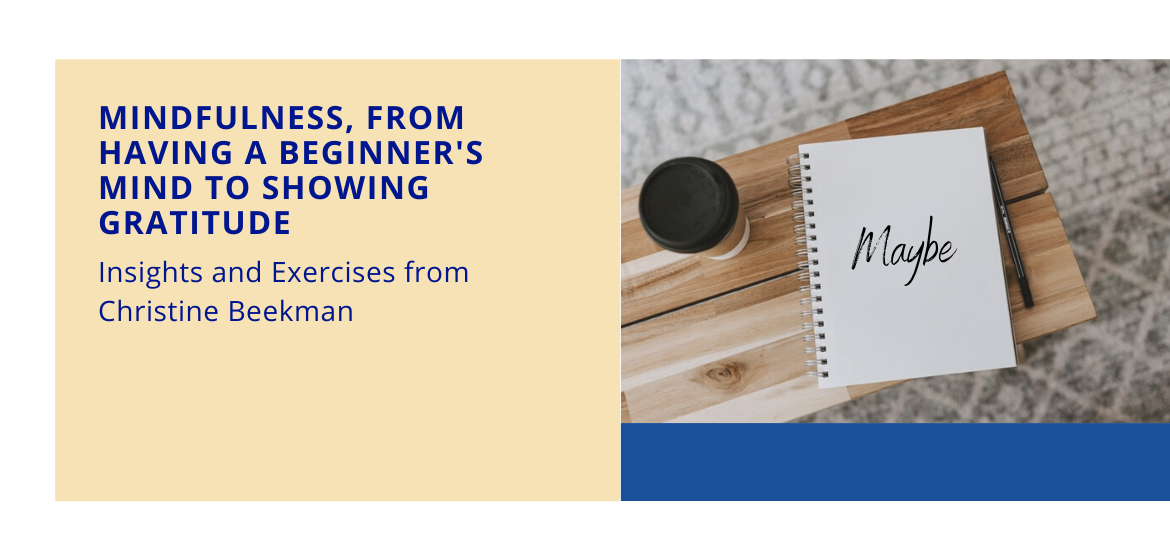
Mindfulness, from having a Beginners Mind to Showing Gratitude
In this mindfulness feature, Christine Beekman focuses on staying in the present, a beginner’s mindset, and also showing gratitude and gratefulness. As part of this, she also highlighted mindfulness exercises that you can do to help develop these skills and traits.
Suffering
There’s always a gift in suffering there always is and it’s to look for that. It’s the same in our relationships when somebody dies, we often go looking for the person in the past “I want this person back” or “I want this experience back”. Of course, we don’t get that but what you do get is the gift the person left behind. That is the experience that we had with them that is in our memories.
Christine gave an example of her own father taking her outside to look at the stars as a child and how she even now still has a love for little lights. When he passed away she went looking in the past. Then she realised she has gotten it all wrong, all we need to do is just sit there and be mindful and feel that experience. She found within herself that feeling when she was looking at the stars as a kid. That is their legacy, that is their gift and you can tap into that whenever you want.
So if you’ve ever lost someone look for that gift that you’ll always get to draw on. Be prepared to accept your feelings of grief and sadness.
Practicing Mindfulness by Staying in the Present
If you’re on a trip somewhere rather than thinking about the destination, think about the journey. We miss the precious moments in relationships because we’re already moving ahead of where they are now.
Focus on the present moment and reflect on the quality of it. Ask yourself the following questions:
- How does it compare with thinking about the past or the future?
- What effect does focusing on the here and now have on your thoughts and emotions?
- We tend to react to situations with an attitude of the grass is always greener on the other side. Our next experience or where we are heading will be better.
When it comes to experiences we tend to react as follows:
Grasping: Attachment to pleasant experiences -> holding on to, fear of loss
Aversion to unpleasant experiences: pushing away what we do not want -> stress each time there is a bad experience
We have a tendency to be in autopilot and this can result in us missing out on the wonder of being alive. That’s why it is important to practice staying present and being non-striving . With experiences, we often have to put labels on them of good and bad so that we can categorise them. Next time you are doing a mundane task, try observing and describing as you complete the task. It could be washing the dishes, making dinner, etc. Notice when your mind begins to make a judgment. Do not get caught up in the judgment or the fact that you’ve made one. Just notice that your mind is judging and let the judgment go.
Continue to check for judgment, then you’ll start to begin to notice when you judge what you observe. Notice the feeling. This way you start to work on being more in the here and now.
Beginner’s Mind
Sometimes in our relationships, we already think we know what the other person is going to do because we are already in the game of pressing buttons (if I do this then they will do that). We are skipping a few steps to where we need to be. There is no need to be an expert, sometimes our knowledge can get in the way. If we take a look at things from a beginner’s point of view (especially what perspective of that big lie) then maybe there is another option.
That is the magic of maybe, when something happens we already have that scenario running in our mind (I’ll always be a failure). Says who?? Where is the evidence that that is true? It can also happen when good things happen and that big lie can lead to self-sabotage. Statements with “always” “totally” “never” when they come up you know it’s time to use, MAYBE.
 Having Gratitude and Gratefulness
Having Gratitude and Gratefulness
This is the greatest of all emotions that can be cultivated. It has a unique relationship with wellbeing. In this situation, we are aware of what we have rather than of what we don’t. It’s important to note though that it is developed by repeated effort. It is a feeling of thankfulness, wonder, and appreciation for life. It is a way to focus on happiness, positive emotions, satisfaction with life and relationships as a cure for envy and disillusionment.
Having gratitude helps to positively reinforce and remind you of:
- The key people in your life
- Your strengths and natural talents
- The road already traveled
- It also acts as a reminder of the wonders of the world such as miracles of nature i.e. how mighty oaks grow
One small little daily mindfulness exercise you can do is have a gratitude journal and in it write three things I am grateful for.
Another thing you can do daily to generate positive emotions is this quick and simple exercise:
Breathing in, I calm my body and mind
Breathing out, I smile
Dwelling in the present moment
I know this is the only moment
There are also some useful mindfulness and gratitude techniques that you can try. Ask yourself:
What is good in my life today?
What went well today?
What part did I play in making good things happen?























